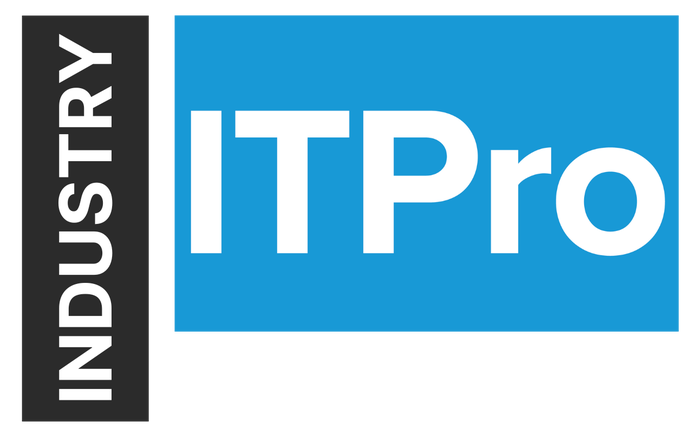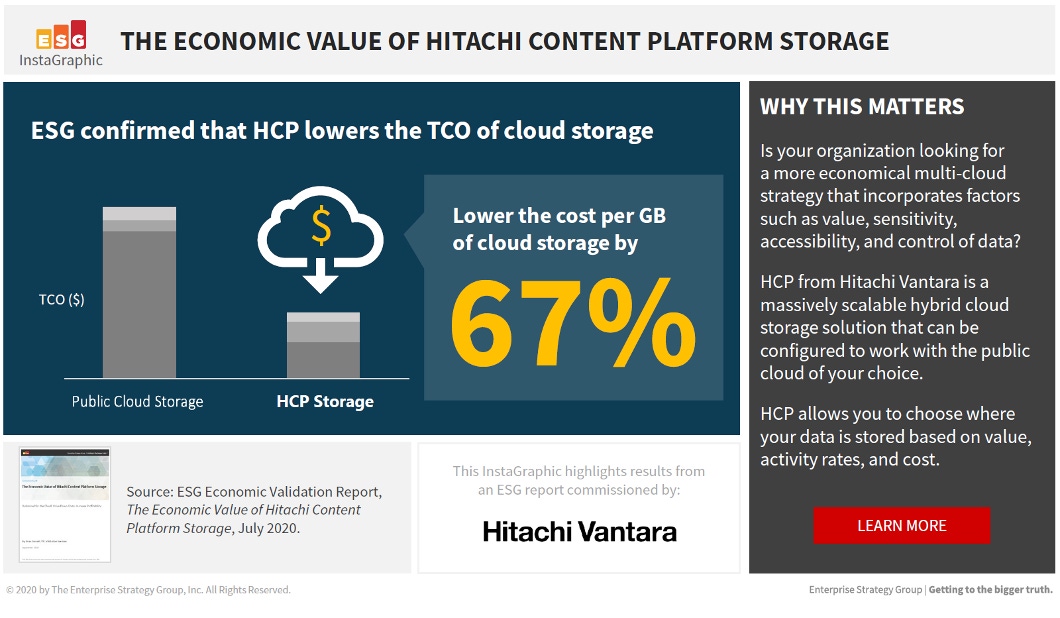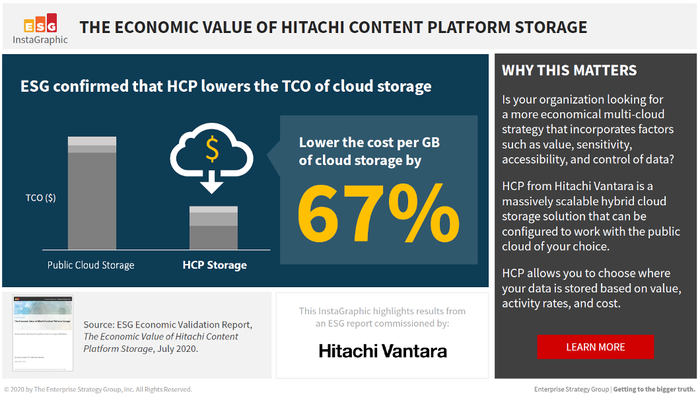
Insight and analysis on the information technology space from industry thought leaders.
The Case for Object Storage vs. Public CloudThe Case for Object Storage vs. Public Cloud
When all costs are considered over three to five years, the TCO for a private cloud solution is lower than renting public cloud storage for most workloads.
November 27, 2020

For many organizations concerned with reining in costs and increasing IT agility, public cloud storage has become an alluring alternative to on-premise infrastructure. In fact, in a recent report, “The Economic Value of Hitachi Content Platform Storage,” ESG found that 94% of surveyed companies use public cloud services. Factors such as easy deployment and no sizeable up-front investment are the main reasons why the public cloud option is so attractive.
However, ESG found that when all costs are considered over three to five years, the TCO for a private cloud solution is lower than renting public cloud storage for most workloads. Besides cost, why, as ESG reports, have 55% of companies moved one or more workloads from the public cloud to on-premise storage?

Screen Shot 2020-11-26 at 8.31.15 PM
Respondents indicated their other top concerns as being data security and compliance. Moving to the public cloud is a risk for organizations because they are relinquishing the control, visibility and safekeeping of their data to the public cloud provider. While public clouds have come a long way in adding in greater compliance and security capabilities, they still lag in their ability to allow organizations to fine-tune configurations, offer granular data management policies, and ensure physical security requirements based on specific compliance or governance regulations. Organizations must know how their primary and backup data is stored, who is accessing it and how long it is retained to meet compliance guidelines. Given the rise of new regulations and data breaches and legal fines making the headlines, many organizations are no longer comfortable taking on the security and compliance liability and risk associated with having their data in a public cloud.
Object storage, previously used for archive and Tier 2 workloads, has found new life as a solution for modern Tier 1 unstructured data sources due to its massive storage capacity, high resiliency levels and intelligent data management capabilities. The digital age has unleashed a steady stream of new unstructured data sources and application workloads, which are ideally suited for object storage. New S3 cloud applications, machine, log and sensor data, and a rise in all kinds of digital content and media are just a few examples driving this new wave. According to ESG research, 53% of organizations will increase spending on on-premises object storage over the next two years to manage this data deluge.
In the past, many organizations viewed unstructured data as a cost burden; however, forward-thinking companies are leveraging their unstructured data along with artificial intelligence and machine learning to drive value, create new sources of revenue, learn more about their customers and increase profitability.

Screen Shot 2020-11-26 at 8.31.29 PM
Still struggling with which object storage option to choose? The ESG report takes a deep dive and compares the cost of renting cloud storage from a public cloud vendor versus buying and owning Hitachi Content Platform (HCP) on-premises storage.
In this economic audit, ESG found that owning Hitachi Content Platform (HCP) object storage is considerably more affordable and reduces TCO of storage by 67% or more. HCP provides value at scale and value over time.
The best part is that opting for HCP doesn’t force you into making an either-or choice. HCP allows you to move appropriate data to and from your choice of one or more public cloud services, it can be deployed as a hybrid workflow spanning on-premises and public cloud, and it can be delivered as a fully managed service through our EverFlex offerings.
The bottom line is: By choosing HCP you don’t have to choose. You get the flexibility, control and cost optimization you want without sacrificing the granular security, governance and compliance you need.
Read the report.
Learn more about Hitachi Content Platform.

Screen Shot 2020-11-26 at 8.57.46 PM
Tanya Loughlin is the Director of Product Marketing for the Hitachi Vantara Content Platform Portfolio, which includes object storage and related cloud storage gateway, file sync and share, data governance, data protection and analytics solutions. Tanya has more than 20 years of experience across various product marketing, voice of the customer and business development disciplines and technologies including cloud, file, object and NAS.
About the Author
You May Also Like








.jpg?width=700&auto=webp&quality=80&disable=upscale)
